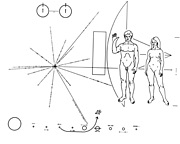 USA Todays's science correspondant Dan Vergano has posted a nice article summarizing a recent paper on the Fermi Paradox published by Milan Cirkovic and Robert Bradbury. The paper, titled "Galactic Gradients, Postbiological Evolution and the Apparent Failure of SETI," posits an explanation to the "where is everybody" question by suggesting that radically advanced machine intelligences migrate to a technological habitable zone where computational process are vastly more efficient.
USA Todays's science correspondant Dan Vergano has posted a nice article summarizing a recent paper on the Fermi Paradox published by Milan Cirkovic and Robert Bradbury. The paper, titled "Galactic Gradients, Postbiological Evolution and the Apparent Failure of SETI," posits an explanation to the "where is everybody" question by suggesting that radically advanced machine intelligences migrate to a technological habitable zone where computational process are vastly more efficient. As Vergano writes in his article,
That matters, because, "as almost anyone having practical experience with computers will have experienced, heat is an enemy of computation," they note. So, they argue, since the stars where these computer-dependent aliens arose will slowly be burning up (our sun will turn into a red giant in 5 billion years, for example), the places where extraterrestrials will slowly migrate to, and perhaps build space colonies, is the place where computers are most comfortable. That would be in the cold depths of space at the edge of galaxies, far from the fiery stars.You can read the entire USA Today article here.
SETI, Cirkovic and Bradbury charge, is "fundamentally flawed" because it looks for signals from aliens from nearby sun-like stars. "Outward migration of advanced technological species should be taken into account in future practical SETI projects," they write. "The true test here would be to detect signs of astro-engineering efforts at the outskirts of nearby spiral galaxies."
Shostak, of the SETI Institute, agrees that intelligent aliens likely are dependent on computers, or are computers themselves. But the assumption that computational efficiency will drive aliens ever outward, overriding any other goal, is a big one, he says. "It's a clever idea, but more than likely to be wrong."

2 comments:
Not sure about the mention of the Uplift series in the first paragraph ...
I would have used Vernor Vinge's A Fire Upon the Deep, which even though it included the fictional 'zones of thought', still had the element of migration towards intergalactic space being beneficial for more highly advanced civilizations.
This idea doesn't significantly reduce the silliness of SETI: intelligences trying to eke out better energy efficiency by reaching ultracold interstellar space that leave whole stars to spill their energy into space rather than Dyson Spheres? Not terribly plausible.
Post a Comment